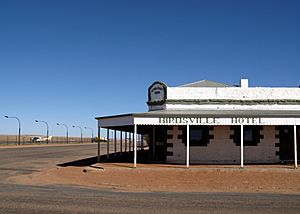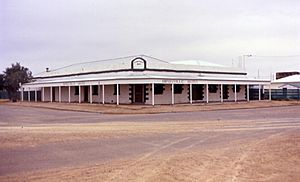Birdsville Hotel facts for kids
Quick facts for kids Birdsville Hotel |
|
|---|---|

Birdsville Hotel, 2007
|
|
| Location | Burt Street, Birdsville, Shire of Diamantina, Queensland, Australia |
| Design period | 1870s - 1890s (late 19th century) |
| Built | c. 1884 |
| Official name: Birdsville Hotel | |
| Type | state heritage (built) |
| Designated | 21 October 1992 |
| Reference no. | 600461 |
| Significant period | 1880s (fabric) c. 1884-ongoing (historical use) |
| Lua error in Module:Location_map at line 420: attempt to index field 'wikibase' (a nil value). | |
The Birdsville Hotel is a very old and famous building in the Australian outback. It's located in the small town of Birdsville in Queensland, Australia. This historic hotel was built around 1884. Today, it is officially recognized as a heritage site, meaning it's an important part of Queensland's history.
Contents
Discovering Birdsville Town
The area where Birdsville now stands was first known as Diamantina Crossing in the 1870s. This was a simple supply stop for people travelling through the outback. By 1882, people started calling it Birdsville. This name became official when the town was surveyed in 1885 and formally established in 1887.
Many early Australian explorers passed through the Birdsville region. You can find monuments in town that remember brave adventurers like Captain Charles Sturt and the Burke and Wills team.
The Famous Birdsville Hotel
The Birdsville Hotel is a single-story building made from local sandstone. It was built around 1884 for a man named William Blair, who was its first owner. He bought the land for the hotel in 1886.
Over the years, the hotel had several owners. After William Blair passed away in 1898, it was owned by different families. In 1979, a famous Australian adventurer named Dick Smith tried to buy it. However, the hotel sadly burned down the day after the contracts were signed, so the sale didn't go through.
Later, in 1980, David Brook and Kim Fort bought the hotel. They owned it for 40 years before selling it to Courtney and Talia Ellis, who run Outback Spirit Tours.
The Birdsville Hotel is still a working hotel today. It has become famous across Australia. Its long history, remote location, and its role in the yearly Birdsville Races have made it a true symbol of the Australian outback.
Hotel Changes Over Time
The hotel has faced some tough times. In 1905, a big storm destroyed parts of the building that were not made of stone. Another storm in 1964 caused a corner of the building to collapse. This section was rebuilt around 1990-91, but it wasn't exactly like the original.
Also in 1964, a fire damaged the front bar, which was then rebuilt. The front porch has also been replaced, and new sections have been added to the northern side. Inside, many of the original surfaces have been changed. Even with these updates, the hotel still keeps its unique historical feel.
What the Hotel Looks Like
The Birdsville Hotel is a one-story building made from local stone. The stone is covered with a special plaster that makes it look like it has lines. The hotel has sides facing Burt and Adelaide Streets. The corner where these streets meet is cut off, which was once the main entrance.
The roof is shaped like a pyramid (called a hipped roof) and is covered with corrugated iron. A low stone wall, called a parapet, hides the roof. This wall is taller at the corner and has the words "Birdsville Hotel" and "Established 1884" written on it.
A roof-like structure, called an awning, runs along the street sides. It's supported by wooden posts and has a decorative wooden edge. The stone blocks around the windows and doors, called quoins, are painted a darker color. This has been a feature since at least the 1920s. There are also newer parts, like a beer garden and extra bars.
Across the road from the hotel, you can find a monument dedicated to Augustus Poeppel. He was a surveyor who mapped the borders between Queensland and South Australia.
Why the Hotel is Important
The Birdsville Hotel is listed on the Queensland Heritage Register because it meets several important criteria. This means it's recognized for its special historical and cultural value.
A Glimpse into Queensland's Past
The Birdsville Hotel, built around 1884, shows us how early settlements grew in the far western parts of Queensland. It's a key reminder of the first cattle stations and communities in the Diamantina district.
A Rare Outback Treasure
This hotel is one of only three old stone buildings left in Birdsville. The others are the former Royal Hotel (from around 1883) and the police station and courthouse (from 1888-90). These buildings help give Birdsville its unique historic look. The Birdsville Hotel is also a rare example of a late 19th-century outback hotel. By studying it, we can learn a lot about how these buildings were designed and used in the past.
Understanding History Through Architecture
The Birdsville Hotel is a great example of a building style that was common in central Australia in the late 1800s. This style used stone to help keep buildings cool in the hot, dry climate. It also made up for the lack of wood in the area. The hotel helps us understand how people built homes and businesses in challenging environments long ago.
A Beautiful and Iconic Landmark
The hotel has a special beauty that adds to the look of Birdsville. It's a very recognizable landmark in the town. Along with the other old stone buildings, it helps create the historic feel that makes Birdsville a popular tourist spot today.
A Symbol of Outback Culture
The Birdsville Hotel is more than just a building; it's a cultural icon for Australia. It has become part of the legends and stories of the central Australian outback. Many people feel a strong connection to this place because of its history and its role in outback life.


